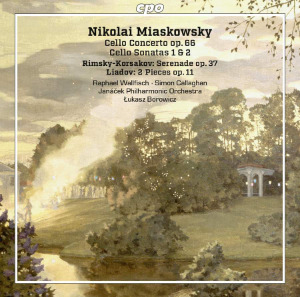
Nikolai Miaskovsky (1881-1950)
Cello Sonata No. 1 in D major Op. 12 (1911)
Cello Sonata No. 2 in A minor Op. 81 (1938)
Cello Concerto in C minor Op. 66 (1944)
Anatloy Liadov (1855-1914)
Prelude, Op.11 No.1 (1885-86)
Mazurka, Op.11 No.3 (1885-86)
Nikolai Rimsky-Korsakov (1844-1908)
Serenade, Op.37 (1893)
Raphael Wallfisch (cello)
Simon Callaghan (piano)
Janáček Philharmonic Orchestra/Łukasz Borowicz
rec. 2020, House of Culture, Ostrava; Wyastone Concert Hall, Wyastone Leys, Monmouth, UK
cpo 555 420-2 [76]
This is by no means the first time that Miaskovsky’s Concerto has been coupled with his two Sonatas, but it makes better sense, it strikes me, than coupling it with the Elgar (on the alleged ground that they’re both somewhat ‘gloomy’), as Jamie Walton does, or with Prokofiev’s works for cello and orchestra (good friends, Russian) as Truls Mørk does. They’re stylistically independent and so a succinct collection such as this is a viable idea.
Raphael Wallfisch has been teamed in Ostrava with the Janáček Philharmonic Orchestra under Łukasz Borowicz, an expert exponent of Polish modernism on disc. I like the prominence given to the winds, and to depth of bass tone, in this recording and I also like the way Wallfisch deploys his range of tonal resources. The orchestra offers a lithe corporate identity and the tempi taken are sensible, flowing but flexible, Wallfisch playing the second subject of the first movement with lyric intensity. The contrast between athletic and introspective is firmly sculpted in the second of the two movements. The cadenza is notably successful, and the rugged playing gradually gives way to melancholy reflections as the concerto ends.
For the two sonatas Wallfisch is joined by Simon Callaghan in Wyastone Concert Hall and their exploration of the First Sonata is full of refinement and tenderness. Wallfisch ensures his vibrato is under control and shades and caresses the line, remaining intonationally pure at the start of the final movement which he and Callaghan duly play appassionato. They also keep the music flowing freely and no discursive elements intrude. It’s a youthful, quick reading and all the more successful for that.
The Second Sonata is full of subtle Francophile touches and the performance is rather reminiscent of Rostropovich’s recording with Alexander Dedyukhin, though the Russian pairing outpace everyone, including Wallfisch and Callaghan, in their turbocharged ‘con spirito’ finale. Though he’s less exciting, Wallfisch’s playing in the slow movement is admirable, maintaining narrative continuity.
They also play a few charmers to add something novel to the programme. There are two arrangements for cello and piano of piano originals by Liadov, with whom Miaskovsky had studied. The Prelude is wistful, whilst the Mazurka is a genial Chopinesque affair. Rimsky-Korsakov’s Serenade is better known and a deft small-scale work.
There are numerous competitors, some recording only the concerto, others only the sonatas but to simplify matters and consider those who have recorded both (and which I’ve heard), I’d just about plump for the eloquent Marina Tarasova (Regis RRC1050). Kyrill Rodin is decent in the sonatas but impossibly slow in the concerto.
However, this latest recording is finely calibrated and excellently played and recorded and you might well find it offers the lyricism and energy you need.
Jonathan Woolf
Help us financially by purchasing from




















